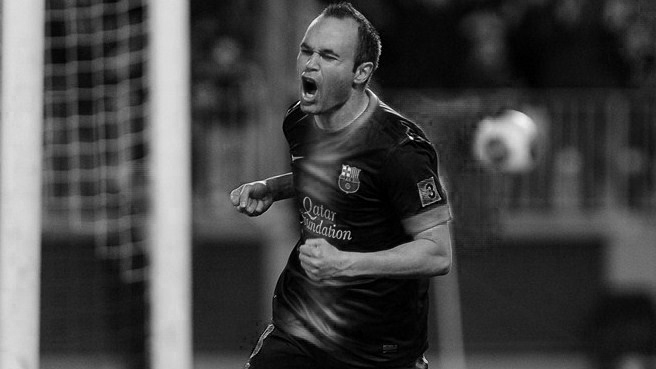
Two boys grew up together in Spain’s Catalonian capital, Barcelona; both with an undying love of football. Best friends from a young age, it was an ironic twist of faith that they were admitted into the academies of the city’s two fiercest rivals — one going to Barcelona, the other to Espanyol.
Despite the rivalry of the clubs that they soon grew to love, and becoming vital parts of their teams from a relatively early age, the bond between the two players grew with time. It was telling that when Dani Jarque, at the young age of 26, was made captain of Espanyol, the man from Barcelona – his rival on the pitch – was there to celebrate with his best friend.
They may even have discussed the upcoming World Cup that year, with both men having a genuine chance of making the Spanish squad for the tournament.

However, just one month after those celebrations, Jarque died of a heart attack. His friend, was just as devastated as those in the Espanyol camp, if not more so.
Fast forward almost a year and in the final of the World Cup, when the man from Barcelona donned the Spanish Roja, his departed friend must have invariably crossed his mind and when he stepped out onto the field, he must have been overwhelmed by his memory.
What happened next was surely fate. With less than five minutes to a penalty shootout, with both teams having failed to break the deadlock, Cesc Fabregas passed the ball to his Barcelona teammate, who took one touch and then volleyed it into the back of the net.
As he ran off to celebrate, letting out a scream of pure joy, he removed his shirt. Underneath, on his white vest, were written the words, ‘Dani Jarque siempre con nosotros [Dani Jarque, always with us]’.
After the emotional celebrations subsided, Andres Iniesta looked up to the sky and gestured to his friend, as if sure that he was looking down towards him. “I wanted to carry Dani with me,” was the explanation that Iniesta gave after the match.
A living legend – if ever there was one – and a man for the big occasion, Iniesta is arguably the greatest attacking midfielder, if not the greatest midfielder outright, to have graced the sport.
Blessed with the silkiest of touches and the uncanny ability of ghosting through even the most ardent of defences, Iniesta has the happy knack of scoring vital goals when it matters the most; his outside of the foot stunner against Chelsea in the last minute of their Champions League semi-final at the Stamford Bridge summing up the player.
As Spain became the first team in history to win three consecutive major international tournaments in a row, it was Iniesta who made things happen and was part of the team of the tournament for all three competitions.
Spain’s best player in the 2010 World Cup alongside David Villa, winning the Man of the Match accolade in the final, Iniesta further upped the ante in the 2012 Euros. Pulling the strings for the defending champions and the main pivot of a sans striker attack, as Xavi Hernandez’s influence waned, he won three Man of the Match awards along the way and was selected as the Euro 2012 Player of the Tournament.
For Barcelona, Iniesta is just as crucial – the Catalonians often rise when Iniesta rises and their dips usually coincide with his. Forming a formidable trio alongside Lionel Messi and Xavi, he was an integral part of the team that won an unprecedented six trophies under Pep Guardiola.
Iniesta’s incredible consistency in the past few years is highlighted by the fact that he has been awarded La Liga’s Best Attacking Midfielder award in four of the last five years – only missing out in 2010 when he was plagued by injuries, most notably to his thigh. He was also part of the Uefa Team of the Year for four years running, from 2009 to 2012.
Six La Liga titles, two Copa del Rays, six Supercopa de Espana, three Champions League titles, two Uefa Super Cups, two Fifa Club World Cups, one Fifa World Cup and two Uefa European Football Championship titles under his belt and the man is yet to hit 30.
Iniesta has won all there is to win at club and international level and both Barcelona and Spain have reached unprecedented heights with Iniesta at their heart.

A man known for his shy demeanour, Iniesta is perhaps the only Barcelona player in history who gets a standing ovation at Espanyol. Unassuming, intelligent, friendly and down to earth, Iniesta the man, is just as good as Iniesta the player and with every silky touch, Dani Jarque lives on.
Published in The Express Tribune, April 11th, 2014.
Like Sports on Facebook, follow @ETribuneSports on Twitter to stay informed and join in the conversation.
COMMENTS (4)
Comments are moderated and generally will be posted if they are on-topic and not abusive.
For more information, please see our Comments FAQ

1724238420-0/Untitled-design-(3)1724238420-0-165x106.webp)

1731678234-0/pete-(1)1731678234-0-165x106.webp)





1731658159-0/BeFunk_§_]_-(19)1731658159-0.jpg)
1731653601-0/Copy-of-Untitled-(43)1731653601-0-270x192.webp)






You are not the best soccer player because messi is!!!sucker!!!!
Andres Iniesta is the definition of a sportsman, the sportsmanship and sportsman spirit.
Bringing class and emotion into the game.what more could a fan ask for? :')
This guy is a true magician. The most creative attacking midfielder I've ever seen.